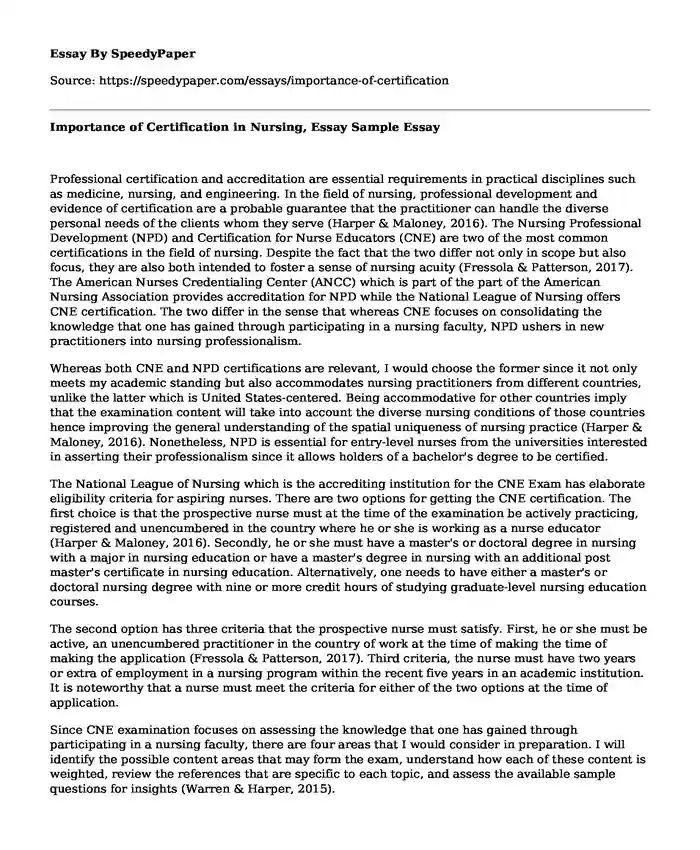Professional certification and accreditation are essential requirements in practical disciplines such as medicine, nursing, and engineering. In the field of nursing, professional development and evidence of certification are a probable guarantee that the practitioner can handle the diverse personal needs of the clients whom they serve (Harper & Maloney, 2016). The Nursing Professional Development (NPD) and Certification for Nurse Educators (CNE) are two of the most common certifications in the field of nursing. Despite the fact that the two differ not only in scope but also focus, they are also both intended to foster a sense of nursing acuity (Fressola & Patterson, 2017). The American Nurses Credentialing Center (ANCC) which is part of the part of the American Nursing Association provides accreditation for NPD while the National League of Nursing offers CNE certification. The two differ in the sense that whereas CNE focuses on consolidating the knowledge that one has gained through participating in a nursing faculty, NPD ushers in new practitioners into nursing professionalism.
Whereas both CNE and NPD certifications are relevant, I would choose the former since it not only meets my academic standing but also accommodates nursing practitioners from different countries, unlike the latter which is United States-centered. Being accommodative for other countries imply that the examination content will take into account the diverse nursing conditions of those countries hence improving the general understanding of the spatial uniqueness of nursing practice (Harper & Maloney, 2016). Nonetheless, NPD is essential for entry-level nurses from the universities interested in asserting their professionalism since it allows holders of a bachelor's degree to be certified.
The National League of Nursing which is the accrediting institution for the CNE Exam has elaborate eligibility criteria for aspiring nurses. There are two options for getting the CNE certification. The first choice is that the prospective nurse must at the time of the examination be actively practicing, registered and unencumbered in the country where he or she is working as a nurse educator (Harper & Maloney, 2016). Secondly, he or she must have a master's or doctoral degree in nursing with a major in nursing education or have a master's degree in nursing with an additional post master's certificate in nursing education. Alternatively, one needs to have either a master's or doctoral nursing degree with nine or more credit hours of studying graduate-level nursing education courses.
The second option has three criteria that the prospective nurse must satisfy. First, he or she must be active, an unencumbered practitioner in the country of work at the time of making the time of making the application (Fressola & Patterson, 2017). Third criteria, the nurse must have two years or extra of employment in a nursing program within the recent five years in an academic institution. It is noteworthy that a nurse must meet the criteria for either of the two options at the time of application.
Since CNE examination focuses on assessing the knowledge that one has gained through participating in a nursing faculty, there are four areas that I would consider in preparation. I will identify the possible content areas that may form the exam, understand how each of these content is weighted, review the references that are specific to each topic, and assess the available sample questions for insights (Warren & Harper, 2015).
Becoming a CNE or NPD provides me with the requisite professional basis to recognize and respond actively to the ever-changing nursing environment replete with evidence-based proactive and individualized care (Warren & Harper, 2015). They also improve my sense of responsibility and accountability as a practitioner resulting in unwavering nurse-patient goodwill whenever at work (Fressola & Patterson, 2017). The field of nursing is challenging, prone to burnout and stress hence the accreditation nurture in me the motivation to remain resilient to such eminent challenges. They enable me to gain and sustain competencies in the dynamic dimensions of practice, quality, and safer patient care.
References
Fressola, M.C., Patterson, G. E. (2017). Transition from Clinician to Educator: A Practical Approach. Jones & Bartlett Learning, Burlington, MA.
Harper, M. G. & Maloney, P. (2016). Nursing professional development: Scope and standards of practice (3rd Ed.). Chicago, IL: ANPD.
Warren, J. I. & Harper, M. G. (2015, July). Nursing professional development role delineation study. Presented at the ANPD Annual Convention, Las Vegas, NV.
Cite this page
Importance of Certification in Nursing, Essay Sample. (2022, Mar 02). Retrieved from https://speedypaper.com/essays/importance-of-certification
Request Removal
If you are the original author of this essay and no longer wish to have it published on the SpeedyPaper website, please click below to request its removal:
- Drug Abuse Essay Example at No Charge
- Free Essay on Medical Error Disclosure
- Dynamics of Abortion, Free Essay for Students
- Article Review: Theory of International Politics, Free Paper Sample
- Free Essay Providing a Critical Examination of the Specified Book on Pearl Harbor
- To Any Would-Be Terrorists - The Essay Analysis Example
- Free Essay Example: Superstition Presentation
Popular categories





